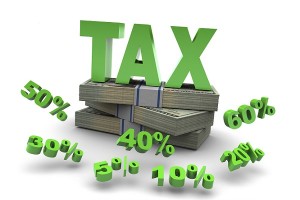
When Ron was in law school, on the first day of his class on income tax law, the professor was singing praises of income taxes and got carried away. The prof, an expert who had written the book on the subject, said that income tax law is good law because it’s not an all-or-nothing thing like much of civil or criminal law. Instead, it’s proportional.
That’s true, of course, although not quite the high virtue he seemed to suggest. Anyway, when he said the income tax was perhaps one of mankind’s great inventions, Ron objected.
Ron noted that there are two basic ways people earn income and thus must pay an income tax. First, one can do paying labor. Second is saving and investment. Both of those activities, he noted, produce benefits to society and thus are things public policy should promote, not discourage. Further, because taxing anything reduces the amount of it produced, Ron concluded the income tax is not such a good thing. There are better revenue sources, especially consumption taxes.
Well, the prof back-peddled a bit, conceded the problem and clarified what he meant.
All this comes to mind because the federal government recently released its latest analysis of the sources of personal income, based on more than 150 million tax returns for 2015. The personal income tax is the federal government’s largest source of revenue. In 2015, personal income taxes were levied on $10.4 trillion of income, more than half the gross domestic product (i.e., the American economy).
So, how do Americans earn their money? Perhaps most notable is that the overwhelming portion comes from labor: paid employment and retirement benefits accrued from previous employment. Over $7.1 trillion was earned in salaries and wages, with more than $1.2 trillion from pensions, annuities, social security benefits and distributions from individual retirement accounts. In short, about 80 percent from labor (and investment returns on labor-based retirement investments).
Actually, true labor income also includes employer contributions to employees’ health care and social security, most of which is not taxable.
Just over $1.1 trillion of personal income came solely from investment returns, including net capital gains (the majority), dividends, interest, and rental and royalty income. That’s slightly more than ten percent.
Finally, slightly less than ten percent, or nearly $1 trillion, was earned from two sources that combine investment and labor: partnerships and S corporations, plus business net income. About 22 percent of this mixed income comes from the middle class – folks earning between $50,000 and $200,000 a year in family income.
The first big takeaway is that the income tax overwhelmingly is and must be based on taxing the labor of 125 million people, mostly the middle class, because that accounts for over 80 percent of total personal income. So, when people want to raise income taxes, they are proposing to tax people’s labor, not the fruits of capital investment.
Another takeaway is that getting greatly more government revenues from the rich is also not practical – beyond the fact that empirical research shows government spending is higher than the optimal levels for promoting human wellbeing and fairness. Less than $1 trillion of total personal income derives from business and investment income on families making over $200,000 per year, and just over $1.8 trillion from their wages and salaries.
Both of these income sources are already subject to the highest tax rates, because U.S. income taxes are skewed very progressively by income levels. High tax rates cause people to pay accountants and lawyers to shelter their income from taxes. Due to this fact, total federal income tax revenues relative to the economy have been surprisingly stable over the years, despite changes in the highest tax rates.
Moreover, since high-income people are the engines of the economy, taxing them more is the way to vitiate their incentives to work, save and invest. That would diminish economic growth and likely even precipitate a recession.
In short, the dreams of progressives, Democrats and other leftists for raising personal income taxes, driven mainly by their greed and envy, are a dead end. The tax reduction and reforms recently adopted by President Trump and the Republicans are the way to growth, prosperity and fairness.




Facebook
Twitter
Pinterest
RSS